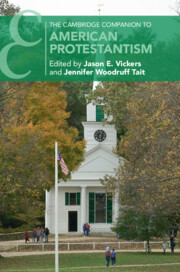Book contents
- The Cambridge Companion to American Protestantism
- Cambridge Companions to Religion
- The Cambridge Companion to American Protestantism
- Copyright page
- Dedication
- Contents
- Contributors
- Acknowledgments
- Introduction
- Part I Historical Overview
- Part II The Religious Culture of American Protestantism
- 5 Bible, Doctrine, and Theology
- 6 Worship and Preaching
- 7 Education
- 8 Work and Vocation
- 9 Politics and Government
- 10 Temperance
- 11 Gender, Sexuality, and Marriage
- 12 From Slavery to Black Lives Matter: American Protestants and Race
- 13 Faith Healing and Modern Medicine
- 14 Mental Illness
- 15 Protestant-Catholic Ecumenism and the Meanings of American Freedom
- 16 Missions
- Part III Theological Traditions
- Selected Bibliography
- Index
- Cambridge Companions to Religion (continued from page ii)
15 - Protestant-Catholic Ecumenism and the Meanings of American Freedom
from Part II - The Religious Culture of American Protestantism
Published online by Cambridge University Press: 11 May 2022
- The Cambridge Companion to American Protestantism
- Cambridge Companions to Religion
- The Cambridge Companion to American Protestantism
- Copyright page
- Dedication
- Contents
- Contributors
- Acknowledgments
- Introduction
- Part I Historical Overview
- Part II The Religious Culture of American Protestantism
- 5 Bible, Doctrine, and Theology
- 6 Worship and Preaching
- 7 Education
- 8 Work and Vocation
- 9 Politics and Government
- 10 Temperance
- 11 Gender, Sexuality, and Marriage
- 12 From Slavery to Black Lives Matter: American Protestants and Race
- 13 Faith Healing and Modern Medicine
- 14 Mental Illness
- 15 Protestant-Catholic Ecumenism and the Meanings of American Freedom
- 16 Missions
- Part III Theological Traditions
- Selected Bibliography
- Index
- Cambridge Companions to Religion (continued from page ii)
Summary
Long before the United States was any more than a collection of British colonies in North America, Protestants viewed Catholicism as a threat to national identity, individual liberty, personal salvation, and the stability of free government. Their fears continued up through the presidential campaign of John F. Kennedy. Understanding why Protestants viewed Catholicism with fear and loathing reveals much about the evolution of American understandings of freedom, which for decades were forged unabashedly in opposition to the Catholic Church and its understanding of what freedom was and how people could attain it. To be sure, social issues like birth control and gay marriage have helped to create a “new ecumenism.” Just as important, however, have been the inequities caused by the advent of modern industrial capitalism, which have forced American Protestants to stop using the Catholic Church as a foil when defining freedom and the conditions that sustain it.
Keywords
- Type
- Chapter
- Information
- The Cambridge Companion to American Protestantism , pp. 277 - 296Publisher: Cambridge University PressPrint publication year: 2022

